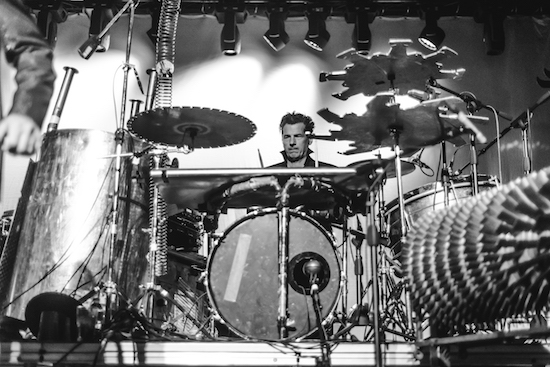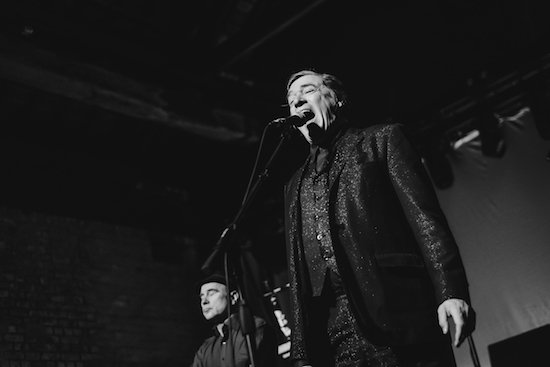Above the entrance to Newcastle’s Boiler Shop is a giant beam. Tapering at each end and with a circular hole in the middle, it might have once been part of a steam pumping engine, now repurposed, trapped in brick, forever stuck. This grade two* listed building began life in the early 19th century as the factory where Robert Stephenson built the first steam railway engines, the immediate successors to the famous Rocket. A wooden, brick and steel womb for the industrial revolution, it was at the forefront of technology 100 years later when it became an assembly plant for Model T Fords. An early British aeroplane was also constructed here, but only flew once – a bank refused to fund the project, unconvinced that flying would take off.
All of which makes this an appropriate venue to encounter Einstürzende Neubauten, the pioneering German group who made the appropriation of the very material of the built environment not only part of their sonic generation, but their lyricism and philosophy too. Yet Neubauten now are a very different beast from the group who drilled underneath roads and, as Blixa Bargeld will recount from the stage, once used a Hamburg flood cellar below a cellar as a recording studio due to its interesting sonic properties.
For a band whose first record was called Kollaps and named their regular series of odds n sods compilations Strategies Against Architecture, the notion of a greatest hits LP and tour is at first sight rather incongruous. Yet there’s always been a sly humour to Einstürzende Neubauten, a wit based in the drama and theatre of what they do. There’s a romance too, an acknowledgement that beauty can be found our ever-evolving dialogue with notions of decay. In this instance it’s all about the latest step on a process of refinement that, coincidentally or not, was present all over 2014’s Lament, their moving and dexterously assembled album marking a century since the outbreak of the First World War.
The 30-something-year-old group’s methodology now focusses on an awareness that a tap of a sheet of metal or a spring can have as much power as going at the underside list of an autobahn flyover with a Kango hammer drill. As they rightly called the 2000 LP from which some of this set is drawn, Silence Is Sexy. The equipment assembled on the stage – jet turbine compressor, cerated sheet steel cymbals, oil drums – is familiar from the many other gigs I’ve seen them play. They’re part of the theatre, looming with potential. There’s a perverse pleasure that tonight they’re used in such graceful ways.

It’s actually quite a contrast with a building where there’s no attempt to exoticise the industrial, it just is, with blue spring post-sunset sky glowing through the original roof lights onto the old beams, magnificently clear PA system and us and Neubauten below as they ease into ‘The Garden’. It sets the tone for the evening. As ‘Nagorny Karabach’ shows, you can make a melody from a jet turbine if you stroke it with the metal of a brush.
Who really wants to hear ‘Yu-Gung’ screeching away at umpteen BPM these days after all? The heavier tracks aired are those that are heavy and tense with reserves of power. In ‘Die Befindlichkeit des Landes’ (one of their greatest moments) the music coils up out of the factory floor, vibrating in the evening air, silence is broken by clangs as loud as any heard here in decades. There’s a wonderful moment at the start of ‘Halber Mensch’ when the bar at the back of the venue tip a load of empty bottles into a bin, the glassy crash accidentally creating a sort of surround sound. It’s a web in which they’ve caught us, a dialogue between building and metal and our soft bodies and Blixa’s still unearthly, penetrating scream.
This is music not of post punk, the 80s, more the mechanical age. It’s hard to see a group emerging from the West in the same way as Einstürzende Neubauten did in the early 1980s, which is partly why I’ve always seen Kinshasa’s junkyard-raiders Konono No. 1 as the closest living entity I can imagine to the Germans, rather than any of the Western groups who claim them as ancestors. That nevertheless does not make them a relic, as rustily obsolete as the old engine that sits at the side of the stage, impossible to remove. Our built environment has changed in a way that excludes this music from happening organically – as Bargeld sings in the delicate ‘Youme & Meyou’ "Out there is always a construction site, a Starbucks or just another Guggenheim". They are no longer making music out of collapsed buildings, but playing concerts in those which were preserved and I for one am fine with that. The Boiler Shop is secure, becoming a vessel for the dissemination of art just as it was once for technology.
This is music that deals with the transience of things, with ageing and war and death and fragile love, and nature too, in the steely whimsy of ‘Total Eclipse Of The Sun’. Neubauten cannot be fixed in time because they’re sonic chroniclers of evolution, change and of chaos and humanity’s place in the natural world. Unlike the macho big booted stomping idiots of ‘industrial music’ that followed Neubauten and fellow-travellers Test Dept and Throbbing Gristle, these are the most human of groups. This why only they could have made a record like Lament, finding ambiguity in the carnage of the worlds first modern conflict: "how did i die? Or didn’t I? Didn’t I die at all" Blixa sings in the conclusion to the set on a song that, curiously could have fitted into a musical as might the capering, always hugely enjoyable ‘Let’s Do It A Dada!’, N.U. Unruh honking away on horns dressed a la Hugo Ball in tall white hat and cape. Neubauten were always masters of welding together the intellectual, the visceral, the sensual.
To cries of "Why-eye Blixa!" they come back on for an encore, finishing with ‘Redukt’, a track that detonates from silence to lunging crashes in an instant, Jochen Arbeit’s guitar shrieking, springs wanging, Blixa bellowing, cymbals wobbling light into the darkest corners of this place that once shook to the music of the industrial age.


